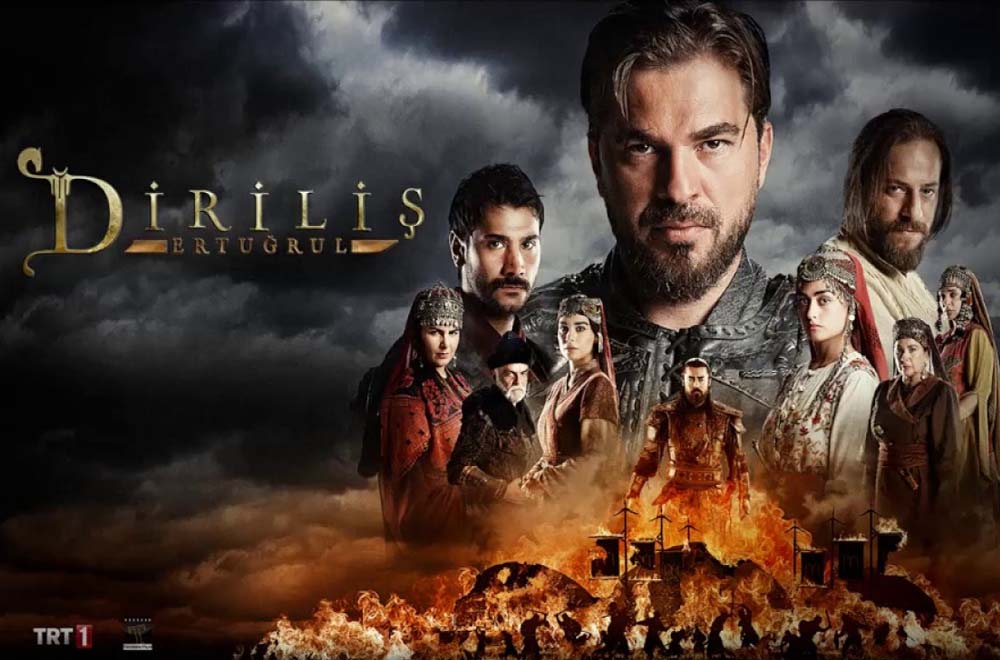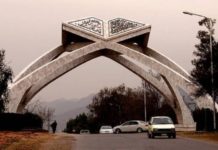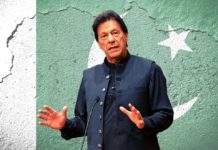A Turkish drama series brimming with tribal intrigues, blood, murder, and conquest — all wrapped in pious religious idiom — has taken Pakistan by storm. Filmed in Anatolia, Dirilis: Ertugrul is a 150-episode fictional account of Ertugrul Ghazi, father of the Ottoman Empire’s founder. As of yesterday (Friday), the YouTube count for the 30th Urdu-dubbed episode had already clocked up 5.5 million views on Pakistan Television.
Even those who made Dirilis are astonished — and hugely pleased — at its tumultuous welcome. Tribal Turkmen fighting for a homeland can’t be expected to capture the imagination of millions in some far-off country. But Pakistan is different. Transfixed, entire families are spending evenings watching it together. They think it is wholesome entertainment and genuine Islamic history.
What history? This is a free-wheeling caricature of 13th-century Anatolia of which we know next to nothing. Facts are not important, says Mehmet Bozdag, the man who wrote and produced the series. To quote: “There is very little information about the period we are presenting — not exceeding 4-5 pages. Even the names are different in every source. The first works written about the establishment of the Ottoman State were about 100-150 years later. There is no certainty in this historical data… we are shaping a story by dreaming.”
That this serial is frankly propagandistic and ideologically motivated is beyond doubt. It has been manufactured for a purpose. But what purpose?
Faked history fuels revivalist dreams, creates false hopes, and suggests the way forward is through the sword.
If it seeks to project Islam as a religion of peace and to counter Islamophobia, then the very opposite is achieved. The first scene of the first episode begins with sword-making and sword-sharpening in the background of nomadic tents. The tribe’s adversaries are Christians and Byzantines whose bloodied bodies lie scattered here and there after every fight. The hero, Ertugrul Ghazi, not only beheads several Knight Templars but also former associates from his tribe, such as Kurdoglu Bey, who he suspects of disloyalty.
Should we be surprised if IS-like organisations find this inspirational? Is glorifying the sword glorifying Islam? Islam can surely be represented in ways more positive than putting a spotlight on power struggles within a tribal society. Far better, for example, would be to build upon Turkish scholars like Ali Qushgi, Taqi-al-Din, or Al-Jazari. Without Islam’s early scholars the colorful tapestry of Muslim culture — and Turkish culture as well — would have been far poorer, its claim to being a great world civilisation weak and unconvincing.
I suspect Dirilis’s real goal is less about Islam and more to vent Turkish nostalgia for a long-lost empire. Production demanded massive funding by the Turkish state. A horse farm was created, together with a special zoo-like area for the sheep, goats, nightingales and partridges that appear on the show. A Hollywood stunt team was hired to train actors for the movie’s staged fights. Erdogan and his family have repeatedly visited the filming site.
Understandably, from within the bastions of Sunni Islam the reaction to this blockbuster has been fiercely negative. Both the UAE and Saudi Arabia have condemned and banned the series, and Egyptian authorities have issued a fatwa decrying this “insidious attempt to re-impose Turkish tutelage” over Arab countries formerly under Ottoman rule. Currently, Saudi Arabia is reportedly funding a $40m counter series called Malik-e-Nar of which trailers have already been produced. Though inadequate it does make the point: Arabs cannot celebrate Turkish imperialism.
Most peoples don’t like invaders, but Pakistan’s psyche is somehow special. Perhaps overwhelmed by Erdogan’s aggressive style, Prime Minister Khan proudly tweeted that Turks had ruled India for 600 years. Historians will raise their eyebrows — this is between quarter-true to half-true only. But it must be rare for a prime minister to hail imperial rule over his land.
Khan is not alone. Pakistan celebrates all post-eighth century invasions beginning with Mohammed bin Qasim’s conquest of Sindh in 712 AD. Urdu novelist Nasim Hijazi’s books, devoured by millions, are an ode to the Arab conquest of India. Like filmmaker Mehmet Bozdag, Hijazi’s strength lay in creating imagery unconstrained by facts.
How should one look at ancient invasions and imperial conquests? To laud or vilify them is equally irrational. India is a stunningly clear example of just how much a society can degenerate if it does that. Hindu revivalism is fixated upon the wicked foreign invader who shattered the seraphic heaven of Mother India. Suddenly all Muslims and Christians became unwelcome. As Narendra Modi’s right-hand man recently declared, foreigners are termites infesting a poor man’s grain store.
But do Hindutva’s mindless ideologues not know that all human civilisation began in Africa and there is no such thing as son of Indian soil? That every single human society on earth today is the result of countless conflicts, wars, and foreign invasions over tens of thousands of years? That even precision DNA tests cannot tell the difference between Hindus and Muslims? These basic lessons are for all, not just Pakistan’s rulers.
A mature attitude towards ancient foreign invasions would be to simply accept them clinically as facts of history. They should be investigated and absorbed without either glorification or condemnation. Doing otherwise is utterly pointless. No one living today can be held responsible for the actions, good or bad, of his or her ancestors. Moreover the mists of time have forever hidden true facts from view.
The creators of Dirilis: Ertugrul want us to wallow in the past glories of others and celebrate imperialism. Hook, line and sinker, we are mindlessly swallowing their proffered bait. This poisonous substance can only reinforce the dangerous delusion that going forward actually means going backward.
Instead, the way forward is to ask that Pakistaniat spring from Pakistan’s native soil. It must be rooted in the diversity of all our peoples and historically formed cultures. The year 1971 showed decisively the limits of pan-Islamism. Aping Saudi culture failed to create a viable Pakistani identity; aping Turkey won’t get us much further. Instead a strong national identity can emerge only if Pakistan embraces pluralism, accepts that Punjab is just another Pakistani province, and helps all citizens achieve a sense of belonging based upon a commitment to equality and justice.








Don’t you dare to publish my comments ??
I am not agreed with some of your statements Mr. Pervez Hoodbhoy.
You have written a long article with many of your own personal thoughts. But it can be challenged by many anyway. Your word is not the law and also does not represent a large number of Muslims, I am sorry to say it.
This drama Ertugrul is based on the history of Turks and Ottoman empire. And “based on” means not exact the history in fine details, but extracted from the history. It’s not a court case or an examination to provide exact the fine details of the history.
Most important thing is that the history must not be twisted and distorted to give it a wrong perspective and meanings than the facts are.
Yes, there was always a bloodshed between religions, nations and tribes. Nobody can or should deny it. Nobody is proud of it. Not the Christians nor Muslims.
As far as glorifying the sword concerns, it is Not a correct statement of yours At All.
What they play in this drama is that ancient history of that bloody wars times, where swords been used against Muslims. And Muslims defended themselves with the swords too.
Christians, other religions and believes were mad about the arrival of a new religion. Because it proved the other religions not good enough to continue believing it. So naturally the old religions wouldn’t accept that, and try to destroy that new wave of religion. So there were lots and lots of attack on Muslims all the times. Therefore they had to be always prepared to defend themselves. Therefore you see the culture of the swords and constant fights. It’s a fact of the history. Not that the Muslims and Islam is a religion of swords and aggression, but because they were attacked all the times by Christians, Jews and others. And defending oneself is not an aggression.
So please do not label Muslims the sword loving aggressive people. The only thing what you can say about them is that, they were not Sissies against their enemies. Which is a thing to be proud of, not to be ashamed of. You seems to be heavily under pressure of other cultures and think styles. This clearly shows the infection of poison of propaganda against Muslims.
Do you see the swords of Muslims only? Can’t you see the swords of Christians at all? And can’t you see who pulled the sword first and started killing?
Don’t you see the swords of USA, Israel and India?
Don’t you see the complots and intrigues of 9/11, Bombay Hotel attack, East Pakistan, Zionists against native Palestinians, Iraq, Syria, Libya, Egypt, etc, etc.
The hate and resistance against the new religion Islam has never been ended. Only it took the other shape, from Templars to Terrorism (fake Muslim terrorists) and Settlements to Economic Hit-men.
When a drama of the 10th century is been shown then you see the war-style of that times. You may criticize on something which is totally wrong in that drama and is not a fact. If there was bloodshed and time of intensive wars with swords, then we all have to accept this fact. Was that right or wrong, is a separate discussion.
Turks had a great empire and they are proud of it. Why they shouldn’t have the right to be proud of it ? And we Pakistanis also admire their achievements against all odds. Nothing’s wrong with that. They fought after-all bravely against the bloodthirsty Templars, who plagued and attacked them time and time again. This is the common history of the Muslims, who did not only defended themselves very effectively but also drove back their enemies and built a great empire.
Are you ashamed of all that history of Muslim achievements? If yes, then you have a serious problem with your identity as a Muslim.
As you suggest that Pakistanis are trying to take the identity of Arab or Turks. It’s a complete false accusation. Nobody is taking the identity of others.
In this the era of global communication and information no wonder that people around the world get influenced of each other’s cultures and habits. But it applies on the whole world, not only on Pakistan. Our cuisine, dress, and music are liked and adopted by many countries, and vice versa. The trick is to keep your good and rich traditions and culture always in tact, and yet learn from other cultures and traditions. Nobody has to be ashamed of it.
So PLEASE do not repeat the false propaganda of non-Muslims against yourself.
Be a proud Muslim, and be proud on your rich and righteous Muslim history.
God bless you.